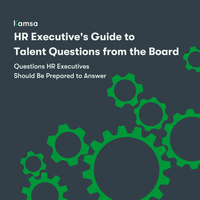
How to Avoid Common Mistakes in Compensation
Overengineering a compensation program can have far-reaching implications ranging from reduced employee engagement, increased employee churn, and difficulty recruiting top talent.A comprehensive compensation program is essential to an organization's growth. Still, companies often get lost in their process and it’s easy to make it more complicated than needed. Overengineering a compensation program can have far-reaching implications ranging from reduced employee engagement (i.e., lower productivity), increased employee churn, and difficulty recruiting top talent.
The Kamsa team has partnered with hundreds of organizations to craft compensation strategies. Across many of those engagements, we've identified some common mistakes made by companies when creating and executing their compensation processes. These include overcomplicating compensation components, not establishing budgets for compensation reviews, and lack of leadership empowerment (when making compensation decisions).
Mistake #1: Overcomplicating Compensation
It's essential to keep compensation simple. Simplify an overengineered compensation program by focusing on the fundamentals of compensation while avoiding these three most common practices:
- Introducing company-wide bonus programs too soon
- Prorating salary increases
- Too many components to sales commission plans
Introducing bonuses too soon in a company's lifecycle (without clear and measurable goals to track incentives against) can lead to payouts that don’t drive desired behavior(s). Employees might feel entitled to their annual bonus instead of driving the intended performance results. Further, a company-wide bonus program in especially earlier stage companies can lead to overspending and harm the company as it scales and grows.
To avoid this mistake, create a structure for base salaries, then equity (i.e., stock options), and later, bonuses when the time is right. Simply being competitive in base pay and equity will set the foundation for future incentives.
Prorating salary increases based on tenure (while ignoring an employee's market position) is another typical mistake companies make. Yes, it may help save some costs but will hinder moving the needle for employees with salaries below market. Getting employees’ pay right from the start becomes embedded within the company culture and becomes less of a headache in the future.
Too many components to commission plans can confuse managers and employees, leading to losing sales reps’ trust and company money. Sales targets that don’t align with top sales strategy can creep into plans, driving the wrong selling behaviors and unnecessary costly payouts. Commission structures that are too complicated can be administratively burdensome for HR and Finance, which is not scalable and leads to delays or errors. Focusing on a few top priorities helps ensure alignment with key sales strategies that drive intentional revenue growth.
Mistake #2: Not Budgeting for Compensation Reviews
Compensation reviews can be hectic for HR and Finance, especially if the footing for the company's compensation practices is not solid.
Valuable resources (e.g., reliable market compensation data) can help Finance establish a better budget for compensation reviews. Once Finance determines a budget, HR/People teams can make data-backed decisions to ensure the budget is divvied out to leaders making the pay decisions (“compensation reviewers”) during the compensation review.
Compensation reviewers need to understand the fundamental decisions surrounding compensation, including job leveling and compensation philosophy. With this understanding, these leaders should have an allocated budget, as well as visibility into data points surrounding each employee's performance, market pay position, last date of increase, and guidelines for increases (e.g., based on performance, market adjustment, promotion).
Mistake #3: Lack of Informed and Empowered Leaders
Many startups limit sharing equity details with leaders (e.g., transparency into historical grants provided to their employees). It can be daunting for cofounders to release control of managing equity grants. However, educating leaders not only gains their trust and accountability, but also equips them to make better pay decisions and be able to answer questions from employees and candidates. This then results in employees more clearly understanding the potential value of their equity, and thus more likely to significantly contribute to and invest in the company's growth.
When leaders understand the compensation programs, they will:
- Make better decisions;
- Have more thoughtful conversations with employees; and
- Build trust and loyalty.
The sooner you educate and are transparent with your company’s compensation strategy with leaders, the less time you’ll be dealing with disgruntled compensation-related questions from employees and the sooner you’ll bring consistency to employee pay.
About Kamsa
Kamsa's compensation management platform empowers HR/People and Finance teams to effectively plan and budget for salary and equity reviews. Our hybrid (technology + consultative) approach to providing reliable, global market data equips leaders to make holistic + informed compensation decisions.


